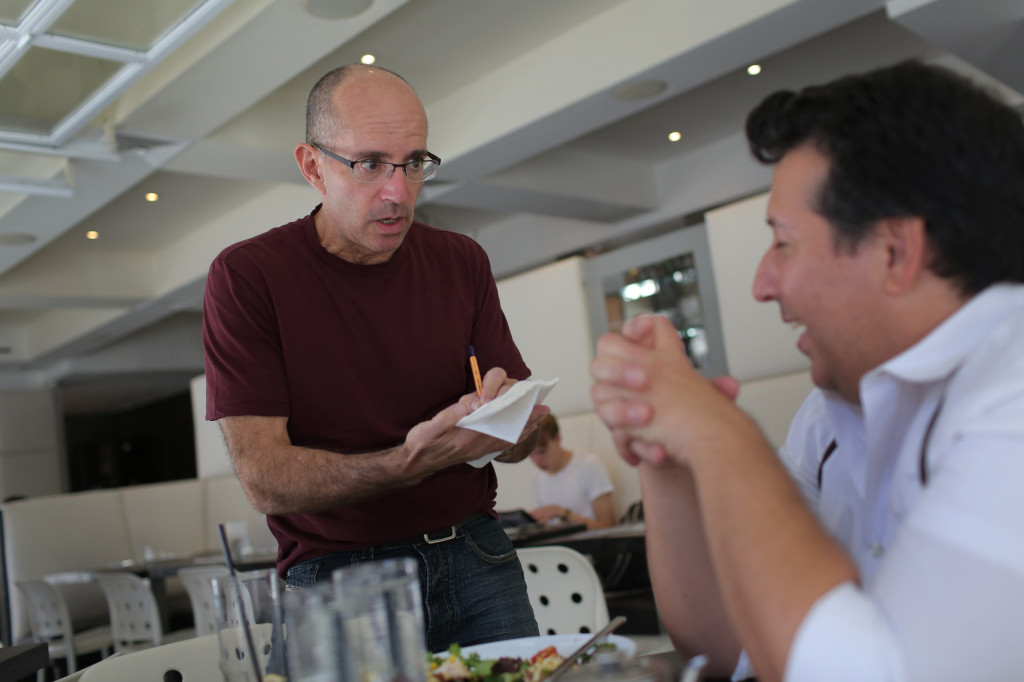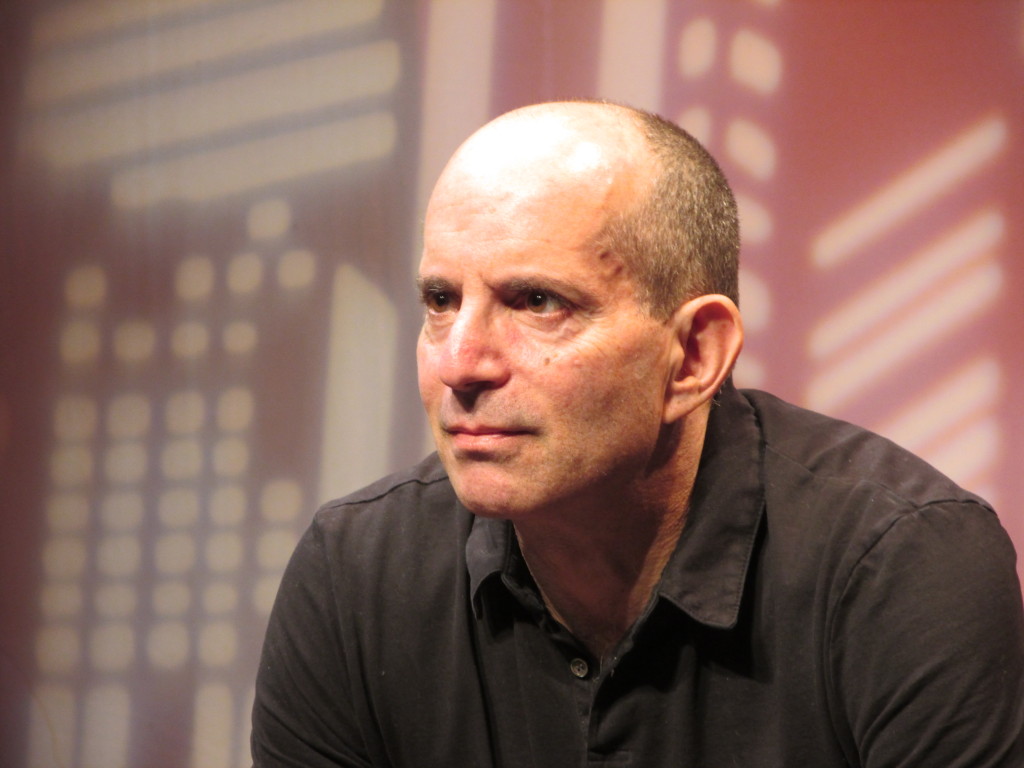My Son The Waiter: A Jewish Tragedy is actor/comedian Brad Zimmerman’s hilarious and uplifting story about the perseverance and passion needed to ‘make it’ as an artist and the rewards that come from never giving up on your dream. Brad moved to New York City and “temporarily” waited tables for 29 years while honing his craft and continuing to pursue his dream. He found success in comedic acting and has opened for Joan Rivers, Brad Garrett and George Carlin. Zimmerman’s touring show stops at Penn’s Landing Playhouse Oct 5-November 19. He spoke with Phindie writer, Debra Danese, about his journey as an actor and waiter.
[Penn’s Landing Playhouse, 211 South Columbus Blvd] October 5-November 19, 2017; www.plplayhouse.com

Debra Danese: You “temporarily” waited tables for 29 years while pursuing your dreams of comedic acting. What motivated you to not give up on your acting career?
Brad Zimmerman: For many years, I did not pursue any career as I did not believe in my product. All I did was study acting and wait tables. By studying, I was putting getting better over getting ahead. I had a number of experiences in acting class which, for me, served as little examples of what I was indeed capable of. Even at my lowest moments, I would think that underneath all of my self- doubt, fear of failure, and negativity, that I really believed I had something. In a sense, it became a challenge to see if I was right or wrong. In addition, so many of my peers gave acting a time period. If they didn’t make it by 35 they would do something else. The arts are not for everyone because you live in the unknown. People who did leave acting wanted the paycheck, wanted security, or wanted a family. None of those things was ever on my radar. By staying the course, I was able to find purpose and real meaning that I would not have found had I opted out. If I had gone to something institutional, like sitting behind a desk or selling furniture, there would have been this huge void. I don’t know for sure what I was born to do, but I do know it has everything to do with being creative until I have taken my last breath.
DD: Tell us about one of your more memorable experiences as a waiter.
BZ: I waited tables, all told, for 29 years. I don’t have any one story that truly stands out, like pouring wine on Henry Kissinger or getting a huge tip from Julia Roberts. The fact is, I was always working in casual restaurants because just the thought of having to recommend a bottle of wine to a customer is anguish. Once, I was working in a very fancy, elegant place and the manager told me I had to read two books on wine and I had to attend wine tastings. If you have never had to sit through a three hour wine tasting, I would equate it to dying. I never read the books and was not at all interested in investing myself in the tastings in terms of learning. When a customer asked me to recommend a bottle of wine, believe me, it was kind of hit or miss. If they asked me to describe the wine, that was Russian roulette. I would just use the wine talk I had picked up in my years such as, “I would recommend the modestly priced cote du Rhone. It is a wonderfully full bodied and well balanced wine. And it has a long lingering, firm finish. I think it will complement the grouse beautifully in terms of its maturity and mellow acidity.” Then I would barf!
 DD: When did your “big break” into acting finally come about?
DD: When did your “big break” into acting finally come about?
BZ: If you think I have had a big break, I love you! The fact is, my career has been about self-improvement, putting the work out there, and I had one or two situations that made it possible to stop waiting tables. In fact, I would probably still be waiting tables, or maybe even working as a night watchman, had these events not presented themselves. I started working on MY SON THE WAITER, A JEWISH TRAGEDY in 2005. For years, I would do it on my own dime at theatres in New York or I would do it for free anywhere. I began making some money in 2011 from a woman who booked it. Things changed in 2013. I sent six minutes of the show to a talent agent and he loved it. He said to me, “This belongs in a theatre.” He came through and secured me a three week run of the show at the Stage Door Theatre in Coral Springs, Florida. The show was extended four months due to word of mouth. At the behest of the owner of the theatre, two producers flew down and saw the show. The next day, they offered to purchase the touring rights to my show for seven years. I have been doing the tour for four years now and have succeeded in retiring my waiter’s apron forever. It now is in the WAITERS HALL OF FAME in Paramus, New Jersey in some strip mall.
DD: You worked on the script for My Son the Waiter: A Jewish Tragedy for nine years. What was your creative process in writing the script?
BZ: I began the piece in 2005. I had some material from previous shows, including standup material that I did when I was working in comedy clubs and on the road as a comedian. I started by putting together the comedy material with the dramatic material as a sort of hybrid. From there, I would hone the comedy material on the road. I would write new material and I would do the show whenever I could, which meant renting theatres. Over the course of the years, I found that what really needed work was the acting part. Doing it over and over helped me to elevate the acting and really do justice to what I had written. My mantra when it comes to the writing is, “Writing the truth as I see it or experience it.” This way, I can deliver the material with authenticity. Since it is my journey, the best way to tell my story is to be myself. As Oscar Wilde once said, “Be yourself. Everyone else is taken.” That is my guide. Whatever I have put into the piece has to come from my gut. It’s got to be emotionally driven otherwise it is not my voice. Having written a lot of the show many years ago, part of the challenge is to keep it fresh. I am constantly rewriting, tweaking the writing, and performing to keep upgrading the show. It is always a challenge to say a line for the 500th time as if you are saying it for the first time, but that is the job of a pro.
DD: What can audiences expect from the show?
BZ: The show is extremely funny and very poignant. It has a universal theme and that is to find what gives your life meaning and real purpose. That’s not the easiest thing to do but, if you are able to find what you were meant to do, your life will have richness regardless of the outcome. The show is not for Jews, it’s not for gentiles, and it’s not for Muslims. It’s for everyone. There is something in the play that will resonate for anyone who comes to the theatre for an experience. It’s going to challenge, make people think, and perhaps even make people reassess their own lives. It might even inspire those in need of it. The show is very moving. I include all of the seminal moments in my life, which means not just the joy, but also the sadness, the struggle, and the depression. Ultimately, the audience will leave the theatre with an experience of one man willing to bare his soul, which is what all art should be.
DD: What would you tell all the aspiring actors out there who are waiting tables while waiting for their break?
BZ: I would tell them to want to enter into the arts. It has to burn in you. In other words, don’t do it unless you are all in! It’s too hard with absolutely no guaranties. The large percentage of actors barely gets by. If you feel like this is your calling, by all means go for it, but keep mastering your craft. That will serve you more than attaining fame or the financial rewards. Keep trying to improve. Keep pursuing the career but always try to get better. That is the ultimate high in this toxic, creative world of Hollywood where the bottom line is money. Not art, but money. Climb the ladder and every once in a while ask yourself, “Is it worth it?” If the answer is yes, keep climbing. When the answer is no, that is when it’s time to find another way to earn money.
[Penn’s Landing Playhouse, 211 South Columbus Blvd] October 5-November 19, 2017; www.plplayhouse.com
